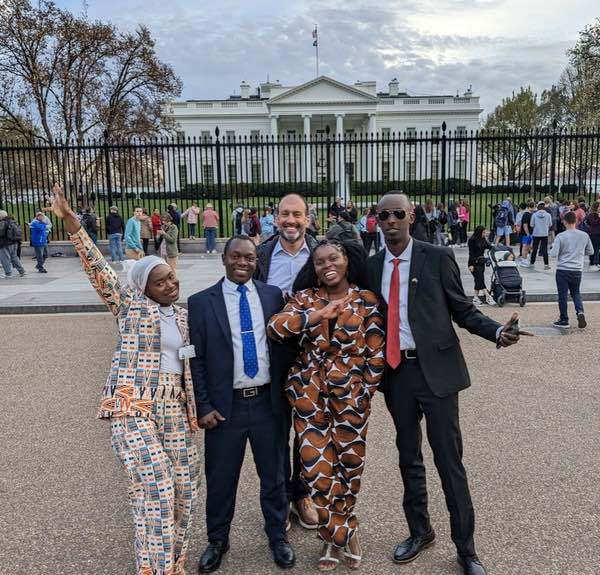
In front: Students from the African Leadership University – Alice Ballo Dyonah (Ivory Coast), Isaac Odhiambo (Kenya), Vivian Amah Ofre (Nigeria), and Mutijima Ali Noble (Rwanda)
Rwandan student Mutijima Ali Noble today encouraged US policymakers and Silicon Valley leaders to strengthen their partnerships with African universities, and help skill up the next generation of African changemakers.
Ali made the call on a visit to Washington, New York, and Boston with three fellow African Leadership University (ALU) students. ALU, which has a state-of-the-art campus in Kigali, Rwanda, and a college in Pamplemousses, Mauritius, is helping train Africa’s leaders and visionaries of tomorrow, through a mix of mission-led study and work experience. It aims to develop 3 million ethical and entrepreneurial African leaders by 2035.
While in the US, Ali and his classmates – Vivian Amah Ofre from Nigeria, Isaac Odhiambo from Kenya, and Alice Ballo Dyonah from Ivory Coast – met with Michael McCaul, Chair of the House Foreign Affairs Committee, John James, Chair of the House Subcommittee on Africa, and members of the US Senate. This was an unprecedented opportunity for the students to present first-hand accounts of the political, economic, cultural and social challenges facing their countries – as well as opportunities for closer partnerships between the US and Africa.
Following their meeting with US policymakers, the students attended Harvard Business School’s Africa Business Conference, and heard from entrepreneurs and policy experts on opportunities for the continent. They also travelled to New York, where they were given a private tour of Google’s offices.
Mutijima Ali Noble said:
“America and Africa’s fortunes are entwined. We face many of the same challenges, from the climate crisis to health emergencies and rapid technological changes. The continent’s young and growing population is full of exciting visionaries who are committed to finding solutions to these global challenges. The US is an undisputed leader in innovation and philanthropy, and by strengthening ties with African universities, it can help our continent translate its vast potential into lasting change – not just in Africa, but all over the world.
“I would like to thank the African Leadership University for giving me the incredible opportunity to present Rwanda’s challenges – and great potential – to influential US leaders. It is my hope that Africa and America can continue to deepen their longstanding partnership.”
Veda Sunassee, Chief Executive Officer at African Leadership University said:
“The African Leadership University was built on the belief that Africa is ripe with game-changing talent. We are committed to taking our students out of the classroom and into the real world, so they can learn from the world’s most innovative leaders, and gain the tools they need to transform our continent for the better.
“The US has unleashed some of history’s brightest ideas, and is home to some of the world’s most ground-breaking companies. I am proud that our students were able to present their ideas for the African continent to influential US policymakers, academics, and business leaders. I hope more American leaders can partner with us and help us skill up the next 3 million African changemakers. After all, Africa’s future is America’s future.”
Africa and the US have continued to build closer relations in recent years. At the US-Africa Business Forum in December 2022, President Biden announced $15 billion in partnerships and trade and investment commitments, focusing on key priorities such as sustainable energy and digital connectivity.
By 2030, Africa is expected to make up 42% of the world’s youth, and five of its countries – Rwanda, Côte d’Ivoire, Benin, Ethiopia, and Tanzania – are among the world’s top 10 fastest growing economies.
Launched in 2015, the African Leadership University aims to shape the next generation of African leaders, combining classes, mentorships, and practical assignments. (End)
